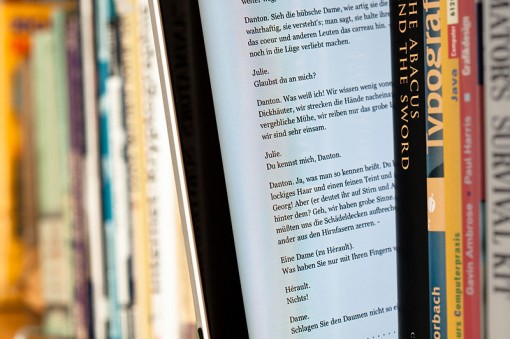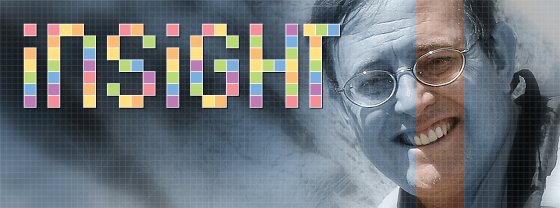
eBooks may be popular, but they are not going to replace paper books any time soon. (Image by Maximilian Schönherr, courtesy Wikimedia Commons. Used under Creative Commons Attribution-Share Alike 3.0 Unported license.)
“The report of my death was an exaggeration.”
When I was writing geology textbooks in the late 1990s, many people came up to me and say “Paper books are dead! In ten years, all books will be electronic, and there will be no market for books in any other form.” I kept hearing those prophecies, year after year, especially when Kindle and tablet computers took off less than 10 years ago. Nevertheless, I kept on revising my various geology textbooks and they kept being printed in new paper editions. Eventually, my publishers went to publishing parallel electronic and paper editions. But here we are, almost 20 years since I heard those first dire warnings, and electronic media have not completely replaced books in paper. Vinyl and cassette tapes and now CDs have been replaced by newer audio media, VHS tapes have been replaced by DVDs and now by streaming videos, typewriters have been replaced by many generations of computers and software, film cameras by digital cameras and now by camera phones, slide rules by calculators and now by phones which do that job, and many other technologies have come and gone in my lifetime—but paper books, which have not changed fundamentally in over the 500 years since Gutenberg printed the first Bible, have not.
As this article points out, eBook sales tripled every year since the introduction of Kindles in 2007, but in 2013 and again this year, their growth slowed to low single digits. About 23% of books sold are eBooks, but hardcovers are still over 25%, and paperbacks over 42% of unit sales. Ebooks may eventually pass hardcovers in sales, but there is no sign that they will drive paper books to extinction any more. Instead, they seem to have reached an equilibrium, where all three versions of a book seem to co-exist peacefully. In this article, numerous publishers suggested that this may be the long-term future of publishing—a stable state with multiple platforms.
So why the difference? Why are VHS tapes and cassette tapes and slide rules and film cameras virtually extinct, but books are not? I would submit that in the case of other technological advances, the new technology was so clearly superior to the old one (better quality, cheaper and faster) that there was no value in keeping the old technology. But eBooks are not superior to paper books in every aspect. Sure, they can be sent electronically in seconds, and can be cheaper than paper books (although textbooks in eBook form are almost as expensive as the paper version). A single tablet can store hundreds of electronic digital media, and there is no additional weight (especially when you take your reading on an airplane).
But as I’ve watched students use both eBooks and old-fashioned textbooks, the limits of eBooks become clear. Real books don’t need batteries, and won’t be ruined if you drop them or crush them or pass a magnet near them. Many real books even get wet and survive, but your tablet is fried if it is dropped in water. Real books are readable in all but the dimmest light conditions, but the screen brightness and glare issues are serious problems with eBooks in certain settings. My students, even those born in 1996, who grew up with electronic media since they were old enough to touch a screen, still seem to prefer paper textbooks. For one thing, they like to physically mark the text with their highlighters to give them a sense of accomplishment in studying—and the highlighting function in eBooks just doesn’t seem the same. Many like to go lie out on the campus lawn or their dorm balcony when doing their reading, and have trouble reading eBook screens in that bright glare. Some like to flip back and forth between the index or glossary and different sections, a much easier thing to do between paper pages than when trying to scroll up and down.
Some books, such as novels and trade books, tend to be just plain text with no illustration, and they are by far the most popular sellers as eBooks. Simple high-contrast black and white text works fine on a computer screen. But other books simply don’t work very well in electronic form. My textbooks are full of color photographs and diagrams, and halftone photographs, which rarely look as clear or bright or vibrantly colorful on a typical tablet screen, compared to the pages of a book. This is even more true for large-format color books such as those Daniel Loxton writes, or large “coffee-table books” which are intended almost as works of art to be admired and studied, not just something to read. As long as those books remain popular, there will a need to print them in paper.
In addition, there is research indicating that reading eBooks is not the same as reading paper books. One study showed that students tended to absorb less from reading eBooks because they were distracted by the other interactive features. Another study showed that Kindle readers absorbed considerably less from their reading than those with analog books, possibly because of the tactile sensation of touching a book and its pages, and knowing where you are relative to the beginning or end of the book by the page thickness. Another study suggests that reading digital books is not as effective as analog books when it comes to reading deeply and thoughtfully. These are just a few preliminary studies, but they are suggestive that reading experiences are not equivalent. Even more importantly, the popularity of paper books among the younger generation weaned on electronic media does not seem to be declining, so there is no clear evidence that generational change will drive paper books extinct.
As author Stephen King (who has sold millions of books in both formats) said in an interview for the Huffington Post, “I think books are going to be there for a long, long time to come.” King compares books’ prospects positively with those of CDs and vinyl. “[A]udio recordings of music have only been around for, I’m going to say, 120 years at the most,” he said. “Books have been around for three, four centuries … There’s a deeply implanted desire and understanding and wanting of books that isn’t there with music.”











I think I get at least the same benefit.I read in the past couple of years, before I went electric. http://larsjaeger.ch/
I agree with the author, but the one advantage of e-books is that you can choose the print size. For people my age (80), this means the difference between reading most of the afternoon, or reading one hour and then resting my eyes (things get blurry if the print is too small).
You’ve overlooked a few advantages, from my experience. I had to get rid of an extensive and varied personal library when I lost my job, and had to go on the ‘couch tour’. Some of them were out of print, so I’ll never be able to re-buy them. Now, I have access to about 1200 books on my Kindle app, on my phone. No more lost books.
And no more putting down the phone — dictionaries and encyclopeadias are a touch away.
I have joint issues on my hands, and can longer hold a paper book long enough to enjoy reading that way anymore, so I think I get at least the same benefit. Because I can hold my ebooks longer, I’ve read about triple the books I read in the past couple of years, before I went electronic. Just saying.
There is another emedia factor in the space shuttle disaster. Read Richard Feynman’s account of his investigation.
He found that there were many proposed corrections to the solid rocket booster design that had been denied because updating the documentation (specification, drawings, test procedures, etc.) would have been TOO EXPENSIVE. Emedia would not remove most of that cost, but it would remove a portion of it.
But that is for information that should have an update process. Most books don’t require frequent updates.
For me, reading on an edevice is only preferred when it is a matter of carrying it around. It is just not as immersive and adaptable to my spur-of-the-moment process of flipping back and forth.
That isn’t as big of an effect as you may think … the major expense in updating technical documentation is paying the tech writers (who have to do a lot more than just change a few numbers), the printing costs are negligible compared to that.
These days printing costs are generally *much* smaller than the labor to create the document – which is why this time of year I’m getting as many political snail-mails as e-mails.
Doctor Prothero omits one of the biggest weaknesses in digital media – one that has contributed to disasters (e.g. one space shuttle disaster – see Tufte’s discussion of this!).
I’ve heard it called “The PowerPoint Effect” but it is really the physical limitations of electronic displays – size and resolution. You may have experienced this trying to navigate with a GPS …. if you zoom out enough to see where you are in an unfamiliar region then you cannot see street names (or even smaller streets). You cannot see both detail and context and that can be catastrophic.
When it comes to reading a diagram or figure of any complexity, the digital displays require zooming in and leaving much of the diagram unseen – and unsee-able. Connections between details in different parts of the whole are lost. The name I heard to describe this came from NASA engineers putting sections of a schematic diagram on different powerpoint slides to see the details but they missed the big picture. (Back in the ‘paper days’ they’d print the diagrams and roll them out on a large table and the engineers could focus on one section AND keep an eye on interactions with other sections of the system.)
For educational purposes severing the link between detail and context is a deal-breaker. So although carrying one petite device is convenient, it turns out size does matter!
Sorry, I’m an idiot: reports are exaggerated!
“The demise … are exaggerated?” I suspect that the internet makes people more careless about language.
I love books and do not like looking at screens for extended periods. I know that this is not an objective viewpoint, and I am glad that so many books do not have to be manufactured. Cutting trees, bleaching pulp, etc… are quite environmentally costly processes. Of course, mining various metals (including rare earth elements) for electronic devices is pretty rough too! (and there’s e-waste as well) What it comes down to for me however, is that in this one life of mine I would rather spend my time with a material like paper than a plastic device. I can’t feel differently…I’ve tried.
With the exception to the access to clean water, I believe best this country (USA) has to offer is free information available to all.
The public library system offers and is evolving into new tech but would still require one to afford such devices. There’s plenty of indigent that would be denied such access if books became non-existent.
If you donated such contemporary device it would still require costs – maintenance, power, replacement, etc., where a book literary has a longer shelf life.
I doubt poverty will ever be eradicated, but hopefully perhaps – long live the book.
Public WiFi with free Internet access would probably benefit more people.
As of January 2014:
90% of American adults have a cell phone
58% of American adults have a smartphone
32% of American adults own an e-reader
42% of American adults own a tablet computer
http://www.pewinternet.org/fact-sheets/mobile-technology-fact-sheet/
The biggest predictor of owning a smartphone is not household income but age.
Under $30K: 47%
Over $75K: 81%
Ages 18-29: 83%
Ages 65+: 19%
Put another way, household income makes little difference for young people, but makes a big difference for old people.
http://marketingland.com/wp-content/ml-loads/2013/06/Screen-Shot-2013-06-05-at-7.24.32-AM.png
I like both. There are some books that I find it easy to read on the iPad when travelling to work (such as on a train, or occasionally on a plane), but equally I love my more weighty volumes in my comfy chair at home. There’s nothing like the look and feel of a beautiful new hardcover either. I’ve got two big bookshelves in the main living area and I love watching my 3-year-old daughter pull out my books and curiously flip through them.
First kindle book I ever purchased – [i]What the Fossils Say[/i]!
Here’s a classic Star Trek clip on the subject:
https://www.youtube.com/watch?v=ERqnwjXkg-0
Just bought my first E-book (as our new laptop has a kindle app) and it was “Dr Adder” by KW Jeter – a book I have wanted to read for 10 years but was expensive to buy in real form. So I am happy with that aspect, but for me a book that I treasure forever (Orwells collected essays in 4 volumes, Barlowes Guide to Extraterrestrials, Jupiters Travels..) these are things I want to have and hold and alwars will. e-books are just never going to cut it there for me. I can see myself buying 1 or 2 e-books a month to read, but I won’t be exactly treasuring them.
I heartily agree. Despite all the latest tech equipment – the wave of the future – and ease of use if one can afford it (tho I , personally, don’t find it so easy at times), hard copy is the reality, solid stuff, and full of detail. My Nook is great for quickie fun reads, as I’m sure smart phones also provide as well as other `quickie’ needs, but, I don’t find it suitable for topics that matter, or for any kind of firm reference or continued referral.
Undisturbed concentration is, apparently, no longer needed in today’s milieu. But sometimes one needs to re-read good books, maybe every 5-10 years or so, as one continues to grow intellectually – and at any age. Obviously, I’m not alone in thinking this. Not as a`niche’ (per John H), but substantially, ISTM that books of all kinds will still (and perhaps do) fill personal bookshelves, and for now, at least, from my own experience, even urban public libraries.
That the rate of adoption slows with time should be no surprise, but Donald makes good points about the niche viability of print. To assume that all forms of print media make good targets for electronic replacement would require the assumption that they are all the same.
Newspapers are over 300 years old, but people prefer to read news online because it’s more convenient, more up-to-date, and allows readers to read multiple news sources and write comments. And advertisers prefer to advertise online because online ads are more targeted and can link to the product’s website.
People are more shallow readers, or rather, skimmers, of news online than in a newspaper or magazine, Max. Sorry, you’re wrong on this one, too.
Wrong on what, people preferring online news over print?
“Half of Americans get news digitally, topping newspapers, radio”
http://www.poynter.org/latest-news/mediawire/189819/pew-tv-viewing-habit-grays-as-digital-news-consumption-tops-print-radio/
“More Americans get news online than from radios or newspapers, Pew’s biennial study of news consumption habits says. Twenty-three percent of people living in the United States said they’d read a print newspaper the day before. That’s half the number who did so in 2000, when nearly 50 percent read a paper the day before.”
There are trade-offs with any new technology. My old dumb phone was cheap, compact, could go a week on a battery charge, and had buttons that could be dialed one-handed without looking. But these advantages are outweighed by the advantages of smart phones with touchscreens.
You listed some advantages of eBooks, and I could list a dozen more. My back used to hurt from all the textbooks I used to carry to school in my backpack. That alone is sufficient reason to switch to a tablet. Electronic text is searchable, and can link to sources. The color of photos on paper looks different under different light sources, and high-quality glossy paper causes glare just like a tablet screen. Photos on a tablet can be zoomed in. A tablet can also play videos and interactive content.
All true–for college textbooks, where the student owns or rents it and has incentive to take care of it. Note however, for K-12 books, districts are reluctant to go to eBooks. Not only are K-12 kids MUCH harder on books than college students (so district-owned tablets wouldn’t last very long), but the Los Angeles Unified School District just went through a giant scandal about the problems with its attempt to buy iPads for students district-wide: poorly managed, not well thought out, and the problems with student abuse or theft of school iPads still seems insurmountable (given how badly they treat other school property). The LAUSD Supt. Deasey just lost his job over it. I don’t think the publishers of K-12 textbooks will ever have to worry about a loss in demand of paper textbooks.
Anything can me mismanaged. Obviously, lending expensive electronics to K-12 students is risky. Some school districts save money by using cheaper tablets. But certainly there are situations where low-tech solutions are the best or the only option. Like, Google Maps is nice, but I like to have a paper map as a backup so I’m not stranded if the battery dies. CD’s and one-way pagers are still used in classified facilities that are cut off from the Internet and prohibit cell phones and thumb drives. For preserving information, there’s the whole issue of whether a data format will be readable in 20 years.